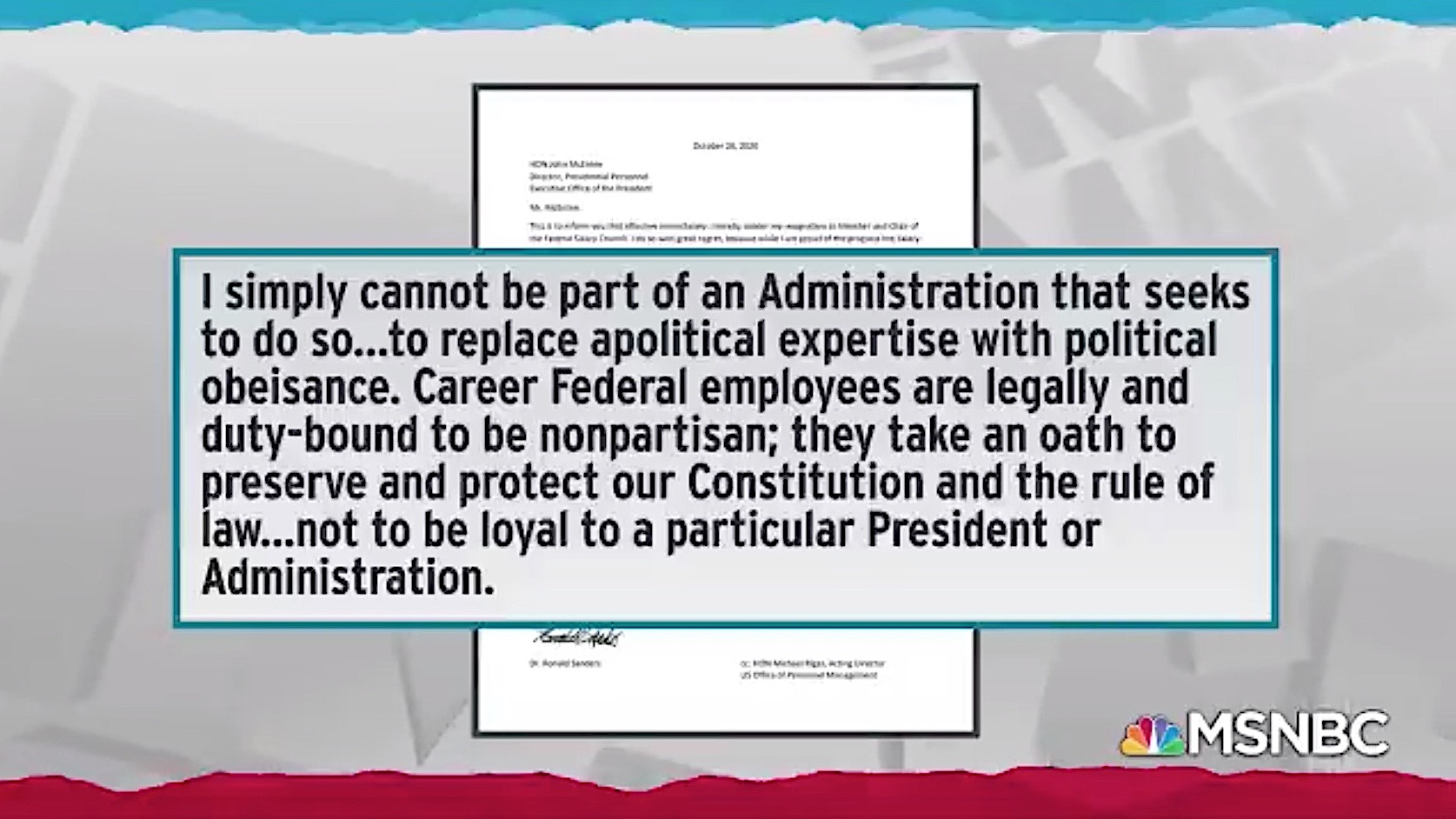Trump appointee resigns over order requiring presidential 'loyalty' for 'apolitical' civil servants


A free daily email with the biggest news stories of the day – and the best features from TheWeek.com
You are now subscribed
Your newsletter sign-up was successful
President Trump signed an executive order last week that could turn tens of thousands of nonpartisan career civil service jobs into "excepted service" positions, stripping federal scientists, public health experts, attorneys, regulators, and other policy professions of civil service protections. These career employees would essentially become political appointees whom the president could fire without cause or recourse.
Ronald Sanders, appointed by Trump to head the Federal Salary Council, cited this order when resigning Sunday, telling The Washington Post on Monday, "I don't want to sound too corny here, but it was just a matter of conscience."
Trump's order "is nothing more than a smoke screen for what is clearly an attempt to require the political loyalty of those who advise the president, or failing that, to enable their removal with little if any due process," Sanders wrote in his resignation letter. "I simply cannot be part of an administration that seeks ... to replace apolitical expertise with political obeisance. Career federal employees are legally and duty-bound to be nonpartisan; they take an oath to preserve and protect our Constitution and the rule of law ... not to be loyal to a particular president or administration."
The Week
Escape your echo chamber. Get the facts behind the news, plus analysis from multiple perspectives.

Sign up for The Week's Free Newsletters
From our morning news briefing to a weekly Good News Newsletter, get the best of The Week delivered directly to your inbox.
From our morning news briefing to a weekly Good News Newsletter, get the best of The Week delivered directly to your inbox.
Sanders, a lifelong Republican who has worked in federal personnel positions over four decades, said in his letter he "cannot in good conscience continue" to serve a president who "seeks to make loyalty to him the litmus test for many thousands of career civil servants." On MSNBC Monday night, Rachel Maddow applauded his letter a "very, very rare Trump administration profile in courage."
Trump's executive order "would be a profound reimagining of the career workforce, but one that may end up as a statement of purpose rather than anything else," the Post notes. "The order fast-tracks a process that gives agencies until Jan. 19 to review potentially affected jobs. That’s a day before the next presidential inauguration. An administration under Democratic nominee Joe Biden would be unlikely to allow the changes to proceed."
A free daily email with the biggest news stories of the day – and the best features from TheWeek.com
Peter has worked as a news and culture writer and editor at The Week since the site's launch in 2008. He covers politics, world affairs, religion and cultural currents. His journalism career began as a copy editor at a financial newswire and has included editorial positions at The New York Times Magazine, Facts on File, and Oregon State University.
-
 ‘Restaurateurs have become millionaires’
‘Restaurateurs have become millionaires’Instant Opinion Opinion, comment and editorials of the day
-
 Earth is rapidly approaching a ‘hothouse’ trajectory of warming
Earth is rapidly approaching a ‘hothouse’ trajectory of warmingThe explainer It may become impossible to fix
-
 Health insurance: Premiums soar as ACA subsidies end
Health insurance: Premiums soar as ACA subsidies endFeature 1.4 million people have dropped coverage
-
 Ex-South Korean leader gets life sentence for insurrection
Ex-South Korean leader gets life sentence for insurrectionSpeed Read South Korean President Yoon Suk Yeol was sentenced to life in prison over his declaration of martial law in 2024
-
 Rubio boosts Orbán ahead of Hungary election
Rubio boosts Orbán ahead of Hungary electionSpeed Read Far-right nationalist Prime Minister Viktor Orbán is facing a tough re-election fight after many years in power
-
 Key Bangladesh election returns old guard to power
Key Bangladesh election returns old guard to powerSpeed Read The Bangladesh Nationalist Party claimed a decisive victory
-
 Epstein files topple law CEO, roil UK government
Epstein files topple law CEO, roil UK governmentSpeed Read Peter Mandelson, Britain’s former ambassador to the US, is caught up in the scandal
-
 Iran and US prepare to meet after skirmishes
Iran and US prepare to meet after skirmishesSpeed Read The incident comes amid heightened tensions in the Middle East
-
 EU and India clinch trade pact amid US tariff war
EU and India clinch trade pact amid US tariff warSpeed Read The agreement will slash tariffs on most goods over the next decade
-
 Israel retrieves final hostage’s body from Gaza
Israel retrieves final hostage’s body from GazaSpeed Read The 24-year-old police officer was killed during the initial Hamas attack
-
 China’s Xi targets top general in growing purge
China’s Xi targets top general in growing purgeSpeed Read Zhang Youxia is being investigated over ‘grave violations’ of the law
